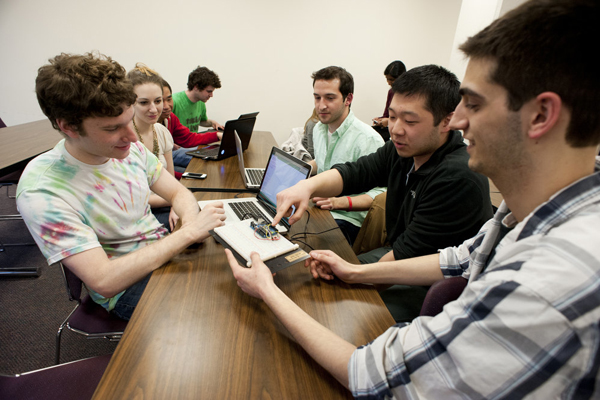Engineering ideas to help people in need

The newly formed student group Enabling Engineering uses engineering principles to design and build projects to help individuals with disabilities.
Source: News @ Northeastern
Using their love of engineering and technology, a Northeastern student group has spent the last two years developing products that will make the lives of Massachusetts residents living with disabilities easier.
Enabling Engineering, which became an official student organization a year ago, grew out of a Northeastern senior capstone project that won the electrical and computer engineering competition in 2012. The winning project was dubbed iCRAFT and featured a robotic feeding arm controlled by the user’s eye. Students said the capstone served as a strong example of how engineering can assist people in need and helped launch the group.
“The founders wanted to create a group that could come up with ideas that could help people with disabilities in their daily lives,” said Aaron Cooper, E’14, the group’s former president.
Team members meet weekly to brainstorm, research, and develop other low-cost solutions that improve the lives of and provide increased independence to individuals with cognitive or physical disabilities and elderly individuals in need of extra support.
Jake Holstein, E’16, who will take over as the group’s president in the next academic year, noted that Enabling Engineering is a unique student organization in that it focuses on creating specific products or projects that support its mission.
The team is currently working on building several products. Examples include a speech-assisting computer for wheelchair-bound people using consumer-based products; and a hospital sleep tracker that will allow nurses to monitor patients’ sleep patterns so they know when to administer medicine or take vital signs.
The group has stages in place to move projects along, including a development stage in which a prototype is built for clients. The group also has an extensive online community that promotes idea-sharing among members, mentors, and alumni.
“It is definitely a different experience,” Holstein said. “You learn the theoretical aspects of engineering in the classroom. But with Enabling Engineering and co-op, you really get an application-based perspective.”
Waleed Meleis, an associate professor in the Department of Electrical and Computer Engineering, was the faculty adviser for iCRAFT and serves in the same role for Enabling Engineering. He stressed that the student organization’s focus on engineering solutions doesn’t mean it’s only for students within the College of Engineering; students university-wide and alumni interested in helping people with disabilities are also welcome.
“Our students have enthusiasm, energy, ideas, and they are incredibly caring,” Meleis said. “Many of them have family members or parents who are disabled or parents who work with disabled people.”
Students also work closely with Fikst Product Development, a Massachusetts-based product design consulting firm that reached out to Enabling Engineering last year with the goal of creating like-minded products. Since then, Fikst has mentored group members to help them develop their ideas.
Meleis also noted that Lifestream Inc., a human services organization based in New Bedford, Mass., provides Enabling Engineering with funding support and connects students with staff members and clients who live with disabilities. Lifestream officials have also visited Northeastern to discuss the organization’s mission.
“We are creating an infrastructure and building relationships for students who have good ideas,” Meleis said. “When students come to us wanting to make a difference using engineering, we can now send them to different groups and have mentors who will help them.”